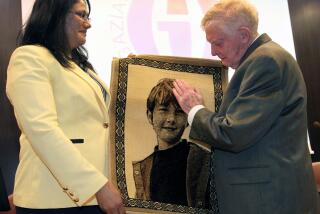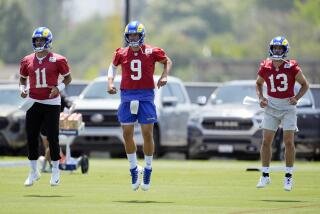Boys Put to the Test in Lifesaving Effort
- Share via
DURHAM, N.C. — Tommy Bennett spent much of his third birthday last week sedated on a hospital bed with six electrodes strapped to his head and loud noises clicking in his ears.
In a nearby building, his 4-year-old brother, Hunter, was held still by strips of medical tape so X-ray technicians could photograph every part of his body.
The boys’ parents, John and Alicia Bennett, stood by as doctors administered a battery of tests to determine whether they are good candidates for experimental umbilical-cord blood transplants.
It is the last hope for saving their lives.
“We hope to celebrate his 30th and 40th birthday someday,” said John Bennett, a trucker in Northern California, lying next to Tommy on the hospital bed Wednesday at Duke University Medical Center.
The Amador County brothers and their older sister, Ciara, 6, have Sanfilippo syndrome, a rare genetic condition in which their bodies fail to produce an enzyme needed to metabolize sugar molecules. As the children age, sugar builds up and causes progressive damage in their organs, joints and brains. Most Sanfilippo patients die during their teenage years.
The disease has no proven treatment. John and Alicia Bennett have staked their hopes on experimental transplants intended to provide the children with the enzyme they lack.
The parents know Ciara is not eligible because the disease has progressed too far. They fear that Hunter may also be deemed a bad candidate because he turns 5 in March, an age at which major deterioration usually has begun.
They will receive the results of the tests for their sons in the next few days.
At Duke last week, the boys were shuffled from blood work-ups to magnetic resonance imaging, eye exams, X-rays and tests to measure brain activity.
Ciara, meanwhile, sat near her parents in a stroller, unable to talk and seemingly unaware of her surroundings, a constant reminder of Sanfilippo’s destructive path.
The Bennetts’ visit to Duke was something they had dreamed of--and dreaded--for months.
“We’re trying to squeak [Hunter] in, if possible,” Alicia Bennett told Dr. Joanne Kurtzberg, director of the pediatric stem-cell transplant program at Duke, who agreed that Hunter was a borderline case.
Kurtzberg said she wants to treat youngsters who have the potential to develop basic skills such as speaking and dressing themselves. That is why she is testing their brain function and developmental status. As it stands, the Bennett boys can’t speak coherently.
“I don’t consider prolonging life enough,” Kurtzberg said, even if parents do.
The parents did not find out that Ciara had Sanfilippo until February 2001, after all three children had been born. The boys’ diagnosis was confirmed last February.
Even if the boys receive the transplants, there’s no guarantee that the procedures will work. Some scientists are skeptical, based on previous results involving Sanfilippo children who received bone-marrow transplants.
But Kurtzberg, one of the few doctors to explore treatments for the disease, said she is hopeful based on the success of cord-blood transplants in children with diseases related to Sanfilippo.
In addition, two Sanfilippo children who underwent the procedure at Duke more than a year ago are showing signs of progress, although it’s too soon to call the transplants a success.
The alternative is death. Even if their boys won’t lead normal, or even semi-normal, lives, the Bennetts are not ready to give up.
“I’m Mom. I have to root for them,” Alicia Bennett said.
On his birthday, Tommy was too sedated to celebrate. The day after, his parents found a Chuck E. Cheese’s restaurant in Durham and held a muted celebration. As his father held him, Tommy tossed miniature basketballs, grinning and giggling the whole time.
The Bennetts had planned an all-out party for 30 relatives and friends on Saturday at Chuck E. Cheese’s in Sacramento, but it had to be canceled because of the last-minute trip to Duke.
Just getting to Duke was a challenge for the Bennetts. Their insurance company, Kaiser Permanente, refused to pay for the procedures because its doctors said there was no evidence showing that they work. Kaiser also said that the children risked serious complications, even death, from the treatment itself.
Kaiser’s position was upheld by an independent panel of medical experts hired by the state to review the case this summer.
Earlier this month, after the Bennetts’ story drew attention from the media and state lawmakers, Kaiser gave a $1-million research grant to Duke, with the understanding that it could be used to cover the boys’ testing and treatment.
Before Kaiser’s donation, the Bennetts had raised more than $140,000, which will now be used for any additional care their children need. Leftover money will be used to help other children.
The family’s story is now making the rounds at Duke, some 2,800 miles away from their home in the small town of Ione, Calif. When John and Alicia Bennett went to fill prescriptions for the children to ward off infections, the pharmacist asked about their insurance coverage.
When the father began to explain the arrangement with Kaiser, the pharmacist responded: “Oh, you’re the million-dollar boys?”
“They have a new name here,” Alicia Bennett joked.
After almost missing their flight to Durham, the family faced a demanding regimen of tests. Tommy, who is normally easygoing, twisted and cried as a nurse drew his blood Monday.
“He fought like the Tasmanian devil,” his father said. “He thought they were going to kill him.”
Hunter was calm during the blood test because a nurse sang to him. The X-rays were another matter.
“We’re just giving your knees a seat belt because we know how wild they are,” a technician said as she restrained Hunter with medical tape. “It’s not that bad, sweetheart.”
But his screams of protest could be heard down the hall. “We’re used to Hunter yelling,” Alicia said, smiling.
By the family’s second day in town, their hotel room looked lived in. A nearly empty box of Dunkin’ Donuts sat on the bedroom counter, alongside a bag of Huggies diapers, a Barney DVD and a big jug of Gatorade. None of the children is toilet trained, so diapers are a staple wherever the family goes.
If the boys are deemed eligible for the transplants, the family will need to move to North Carolina for up to six months. They plan to rent an apartment and a van, and leave Ciara with relatives and friends back home.
If all goes well, the transplants would take place the week before Halloween. The children’s costumes--Tommy as Peter Pan, Hunter as Captain Hook, Ciara as Tinkerbell--may not get much use.
As their story is publicized, the Bennetts continue to receive hundreds of donations and offers of help. Pregnant women have volunteered to donate the umbilical cords of their babies when they are born. A psychic wanted to cure the kids by taking them for two hours. And a letter writer suggested a “miracle” concoction of apple cider, warm water and vinegar.
Alicia Bennett said that with all the hasty preparations for the trip to North Carolina, she hasn’t had time to prepare herself emotionally for the potential transplants. She speaks as if neither boy will be turned away.
“When we come back [for the transplants], that’s when everything is going to hit me like a wall,” she said.
Her husband agreed. “It all happened more quickly than we were prepared for--but we don’t get that choice sometimes.”
*
The Bennetts have created an online journal describing daily developments and posting photographs. It can be accessed at www.caringbridge.org/ca/bennettboys.






